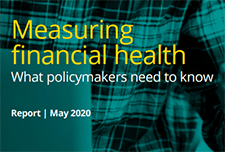Discover financial empowerment resources
Discover financial empowerment resources
This report provides an overview of financial health and the policy responses around the world. Based on this, and the key questions of whether financial health measure more than income and if financial inclusion supports financial health, the report offers recommendations to policy makers on...

This report discusses the interactions between finances and mental health, based on the experience of over 5000 individuals who have lived with mental health problems. Mental health problems leading to relationship difficulties, physical health problems, mental health treatments, cognitive...

The United Kingdom is at the forefront of the global finance industry and is a leader in the fields of financial services, technology and innovation. Despite this high standing, a sizeable number of UK citizens lack access to even the most basic financial services, while still more are forced to...
People living on low incomes have historically been excluded from politics and policy debates, even when the question at hand is how poverty can be reduced or its impacts mitigated. The aim of this research was to explore how people on low incomes perceive politics, understand how far they feel...
This report was commissioned by the SMCPC for the purpose of replicating for the British case, as far as possible, the findings in Our Kids. In this era in which public concern about poverty, inequality, and social mobility has been increasing, our primary aim in this report is to find out if the...
This review looks at the activities, impact, and drivers and barriers to success of four types of community-led approaches: voluntary action, community organising, social action and community economic...
The objective of this discussion paper is to review available evidence from the research and practice of financial literacy as a complementary strategy to asset building. The first section reviews various definitions of financial literacy and proposes financial capability as an alternative. The...
Asset Building for low–income people through matched savings challenges the focus of traditional poverty-alleviation strategies on income support to enable the poor to escape from poverty and improve their economic and social status. It does not deny the necessity nor the benefits of such support...
This guidance note is intended as a practical guide to designing a monitoring and evaluation (M&E) framework for policy research projects or programmes. Its primary audience is M&E designers and managers but it can be useful for anyone involved with M&E activities. The guidance note...
In this paper we seek to determine the effect of assets held in early adult life on later outcomes. We specifically look at wages, employment prospects, general health and malaise. We employ a number of statistical techniques in our search for the causal effect of assets on adult health and...
An individual asset account that can be accessed before the age of 18 could help children in care to develop a sense of control and some measure of security in their lives, support key transitions post-16, overcome some of the barriers to participation in extra-curricular activities, and reward...
In 2005 the Financial Services Authority (FSA) commissioned the Personal Finance Research Centre to undertake an exploratory, methodological study to design a baseline questionnaire that could be used to measure levels of financial capability in the UK. In this report we begin by outlining the...
Tools for Development draws together a range of techniques designed to help DFID officers and others undertake development activities and interventions of any size and kind. Tools for Development aims to help you deliver successful development activities and interventions by giving you access to...
The 2005 Baseline Survey of Financial Capability (BSFC) was designed by the Personal Finance Research Centre on behalf of the Financial Services Authority to measure the four domains of financial capability which we had identified in earlier exploratory work with consumers. The questions set out in...
